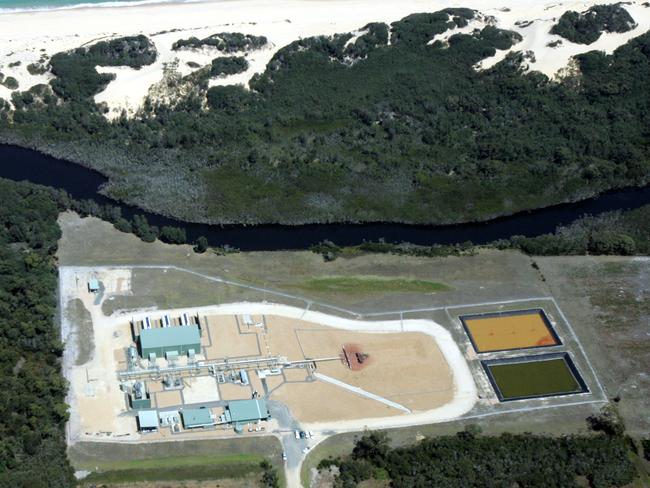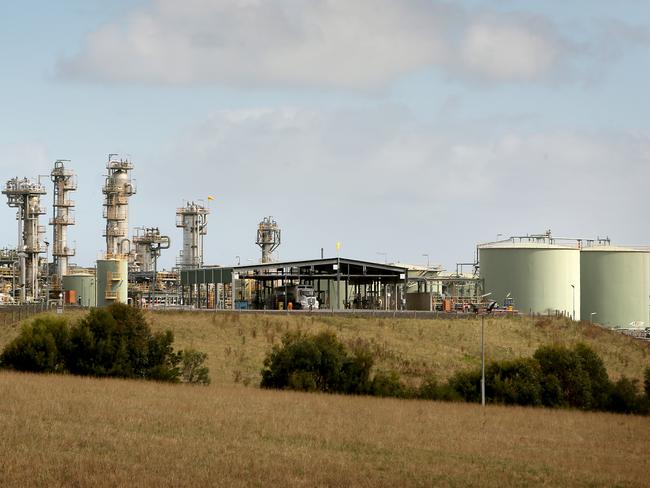‘Gas cartel’ is pushing gas prices up in Australia
AUSTRALIANS have been smashed by huge increases in their bills. This is one of the causes - and it should make you furious.

A CARTEL has gained control of Australia’s gas and is killing the economy, pushing prices up and sending businesses broke, one expert says.
Australians are grappling with huge increases in electricity and gas bills, with one recycling business saying his electricity bill had increased from about $80,000 to $180,000 a month.
Plastic Granulating Services was forced to close its doors last month, leaving 35 employees out of work, and there are fears more could follow as further increases are expected.
Part of the reason why power prices are shooting up is due to the closure of cheap coal-fired power stations but also because of rising gas prices.
Power companies have already warned of increases of up to 8 per cent for residential customers this year and the Turnbull Government has announced measures to try and get more gas into the Australian market.
But energy analyst Bruce Robertson of the Institute for Energy Economics and Financial Analysis, says a gas cartel on the east coast of Australia is also making things worse.
“The Australian gas cartel is restricting supply to the domestic market in order to force up the price,” he said.
“It’s surprising how relaxed the Australian public is about this price gouge. In many other countries, they’d be rioting on the streets.”
Companies were being helped by the secrecy around prices, gas reserves and production costs, which has allowed producers and the owners of pipelines transporting the gas to control the price.
“Prices are too high in Australia because we have given away the ability to control the price — it’s killing the Australian domestic economy,” Mr Robertson said.
This is what’s going on.
GAS PRICES ON THE RISE
Consumers are now paying more for gas in South Australia than they are in Japan, despite the fact despite the fact Japan gets a substantial amount of its gas from the state’s Moomba gas field and it includes the extra cost of liquefaction and shipping.
Between 2006 and 2015, increases to residential gas prices ranged from 23 per cent in Victoria, to 74 per cent in Tasmania.
Industrial users saw price increases ranging from 16 per cent in Tasmania to 113 per cent in North West Queensland.
“There can be no disputing the fact that in Australia today we are paying far more than we should,” Mr Robertson said.
There are a number of different factors for this increase, with industrial prices mostly driven by the wholesale cost of gas. This has less impact on residential customers because network costs make up to 40 per cent of their bills.
But Mr Robertson said he thought wholesale gas prices were increasing because Australia’s domestic gas market was being treated as a “milk cow” by a small number of companies that control the market.
This control has allowed them to charge people unreasonable rates to offset money they are losing on overseas contracts because of a global gas glut.
RELATED: Electricity price rises locked in from July 1, 2017.
Much of the blame for high gas prices has been linked to increased demand after three export terminals were built in Gladstone that enabled companies to ship gas overseas for the first time, combined with a low oil price that has discouraged gas exploration, as well as restrictions on gas exploration and development in states.
The Turnbull Government has announced measures to force companies to keep more gas in Australia for domestic use and Federal Treasurer Scott Morrison has threatened state and territory governments with cutting their share of GST revenue should they limit gas exploration.
South Australia and Queensland are the only two states or territories currently without some of limit on fracking or other gas exploration.
“The longer term solution to the gas crisis in eastern Australia is more gas,” Prime Minister Malcolm Turnbull told 3AW in April.
But there is another factor that is forcing prices up: a gas cartel.
LACK OF OPTIONS
Gas on the east coast of Australia is controlled by a handful of companies and the lack of competition means they can charge higher prices locally.
At the moment, supply is controlled by six companies: Santos, Exxon, BHP, Origin, Arrow Energy and Shell. Some of these companies also control pipelines used to transport gas around the country, also adding to inflated prices.
Restrictions on gas exploration because of concerns around the impacts of fracking has meant new sources of gas are not being developed, and this is happening at the same time that gas from places like the Otway and Bass basins (off the coast of Victoria) is drying up.
Meanwhile gas from places like Cooper Basin is being sent to Queensland for export so domestic users in southern states like NSW, Victoria and Tasmania are becoming reliant on gas produced by the Gippsland Basin Joint Venture (GBJV).
The Australian Competition and Consumer Commission (ACCC) has looked into the problem and released a report in April 2016 that found there was not enough competition to stop GBJV from charging prices on the higher end of the scale.

This situation is made even worse by the fact that GBJV handles the marketing for gas provided by both Exxon Mobile subsidiary Esso and BHP Billiton.
This means anyone wanting to buy gas in Victoria gets one quote, even though the gas is coming from two competing companies.
The ACCC is currently investigating whether this arrangement is uncompetitive and a spokesman said it was expected to announce an outcome later this year.
THE PIPELINE PROBLEM
But it’s not just about the lack of gas supply, the gas also has to get to people who need it and this is where the pipelines come in.
The 11 pipelines that transport gas around Australia are owned by private companies and they may not make it easy for competitors to use them, which further restricts supply.
“Pipelines in Australia are hideously profitable,” Mr Robertson said. “These rorts are sending our businesses broke.”
Less than 20 per cent of the transmission pipelines on the east coast are subject to any pricing regulation and this has allowed companies to make bigger profits.
In comparison a majority of pipelines in places like the United States, New Zealand and the European Union, are regulated because these countries recognise pipelines can wield substantial market power.
According to a ACCC report, one operator estimated it was earning up to 70 per cent more in overall pipeline revenue than it would if it was regulated.
The ACCC found there was evidence 10 out of the 11 pipelines were engaging in monopoly pricing.

While this is not illegal, it is leading to higher prices as well as making the situation even worse because it discourages investment in exploration and reserves development and stopped gas from flowing to where it was valued the most.
For example, the ACCC found Sydney domestic gas prices could be reduced by $0.20 to $1.02 if transportation costs were reduced by 10 to 50 per cent.
And while concerns about fracking have held up development of gas in the Northern Territory, which is reportedly sitting on 180 years of gas reserves, the inquiry also found the pricing for using existing pipelines was a critical barrier to selling that gas.
THAT OTHER THING WE’RE NOT ALLOWED TO KNOW
Not only is the lack of competition and regulation over pipelines leading to monopoly pricing, the sad fact is, we don’t even know what the true extent of the damage is.
This is because companies do not have to reveal the level of reserves and resources, current and expected future production, gas prices, transportation prices and the level and availability of storage.
That’s right, companies don’t have to reveal how much gas is left in their reserves, or the prices they are charging.
The ACCC believes these two things in particular are impacting the market’s ability to respond to changes in gas supply and prices. This also leaves gas users at the mercy of their suppliers when negotiating contracts because they don’t have an accurate picture of whether supply is running low, and whether they’re actually paying a fair and competitive price.

The Australian Stock Exchange does have some reporting requirements on reserves and resources but this only applies to listed companies and can be difficult to track because they may report at different times.
IS THIS GOING TO BE FIXED?
The Turnbull Government is trying to address some of these problems but any real action still seems far from guaranteed.
Mr Turnbull has promised to accelerate gas market reforms to improve pipeline capacity trading and gas trading markets. The ACCC has also been asked to monitor the entire gas supply chain.
But Mr Robertson said the time for inquiries had passed and action needed to be taken.
“I think it’s pretty easy to achieve just by adopting what they do in the US, they don’t need to reinvent the wheel,” he said.
He said what was needed were details on how much it cost to build each pipeline, the amount of depreciation and what it cost to run.
“Once there is proper transparency, it will be hard to operate and get these monopoly super profits, which is what is happening at the moment,” he said.
“Everyone knows what’s going on, we’ve had numerous Senate inquiries and reports, let’s get something done and then review it.”
The Australian Petroleum Production & Exploration Association (APPEA) has rejected suggestions there is a gas cartel in Australia and said the ACCC investigation found no misuse of market power.
But an APPEA spokesman said it did support the ACCC’s recommendation for improvements to market transparency and monitoring.
He also noted that anti-gas campaigns were strangling supply and pushing up prices.
“Importantly, the ACCC inquiry confirmed that removing unnecessary restrictions on exploration and development is the most effective way to boost supply, enhance competition and put downward pressure on prices,” the spokesman said.
Another measure the government has announced to lower electricity prices is to get rid of the Limited Merits Review, which gives energy companies the right to appeal decisions on what prices they can charge transmission and distribution companies.
“This is a fantastic move ... if they can do it,” Mr Robertson said.
This could bring down power bills because the cost of transporting electricity from power stations to households makes up about 40 per cent of electricity bills.
Mr Robertson said NSW’s power bills would actually be lower this year if the Federal Court had not sided with electricity distribution companies like Ausgrid and Endeavour Energy in a case against the Australian Energy Regulator, which was trying to limit the amount they were spending on new equipment.
But Mr Robertson said this would require agreement from the states, which may not be supportive because they often have a stake in these electricity companies.
Are you struggling with to pay high gas bills? Email charis.chang@news.com.au or tweet @charischang2



